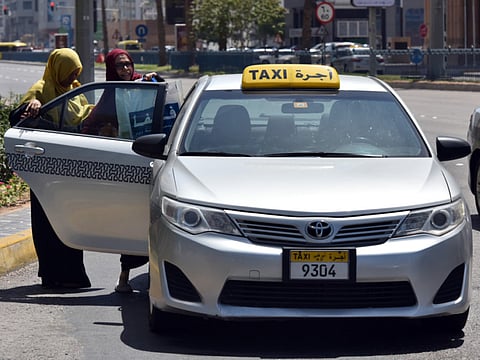Abu Dhabi residents to pay more for taxis from Thursday
New fare structure introduces starting rate and minimum fares of Dh12 during the day and the night

Abu Dhabi: Travelling by taxi is going to cost more in the capital from Thursday (June 1) as a new fare structure comes into effect.
The new fare structure is likely to double spending for most inter-city trips, and commuters who are forced to use taxis to get to and from work told Gulf News this will greatly impact their budgets.
“I pay around Dh7.5 to get from my office in Al Markaziya to my home in Khalidiya. That’s only three blocks away, and now I have to shell out at least Dh12,” said Irene, a 37-year-old sales assistant from the Philippines.
Irene used to pay Dh300 a month to get to work and back, but this will now increase to about Dh480.
“After sending money back home for my 11-year-old daughter, I would use whatever little I had on food and drink. Now I will forced to spend it on basic transport,” she added.
She pays around Dh300 per month to get from home to work and back.
The new fare structure was announced in May by the Integrated Transport Centre, which oversees the operations of 7,645 taxis in the capital under the purview of municipal sector regulator, the Department of Municipal Affairs and Transport.
The fare increase is the first since 2012 and will include flagfall, or starting rate, and the introduction of new minimum fares of Dh12 both during the day and night. Earlier, a minimum fare of Dh100 applied only for nightly trips.
Mohammad M, an engineer from Sri Lanka, said his wife regularly uses the taxi to drop their son off before heading to work. “The new fares, including the minimum Dh12 fee, will make the trips much more expensive and therefore inconvenient, but we don’t have an option,” he said.
Jane, 38, a Filipino florist, was concerned about how much money she would now be able to send to her family back in the Philippines. She uses taxis to travel to and from work. “I came to Abu Dhabi in 2008, and I have always struggled with making ends meet. Sometimes I do not get paid on time and prices and rents are always on the rise for everything. Now it’s the taxis as well,” she said.
The majority of taxi users do not have their own cars, and the only other option for them is the public bus system.
“People are starting to look for alternative means of transportation that are not fully legal just to deal with the high transportation costs,” said Bijoy, 37, a security guard from India.
He takes the bus to get to work from his home in Baniyas, a journey that typically costs about Dh70 by cab.
“I do take taxis to travel around the city and can manage to pay about Dh5 for my trips. So how will fork out Dh12 now? And I paid around Dh50 to get from my home in Baniyas to the airport last time. Next month I will be travelling back to India, and I [will be forced to pay] much more than that,” he added.
— With additional inputs from Layana Al Abdus Salam, intern at Gulf News
New fare structure
Day time: 6am-10pm
Starting fare: Dh5 (up from Dh3.5)
Every 1km: Dh1.82 (up from Dh1.60)
Booking through call centre, including flagfall: Dh9 (up from Dh8)
Minimum fare: Dh12 (up from no minimum fare in the daytime)
Night: 10pm-6am
Starting fare: Dh5.50 (up from Dh4)
Every 1km: Dh1.82 (up from Dh1.69)
Booking through call centre, including flagfall: Dh10.5 (up from Dh8)
Minimum fare: Dh12 (up from Dh10 only at night)
Every minute of waiting (first 5 minutes free): Dh0.50
Source: Integrated Transport Centre
Sign up for the Daily Briefing
Get the latest news and updates straight to your inbox


